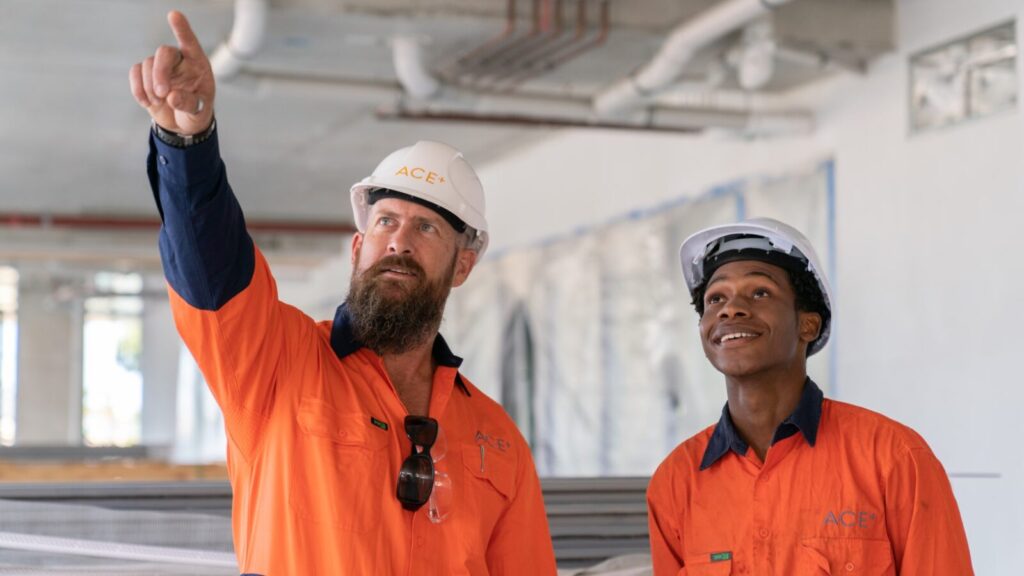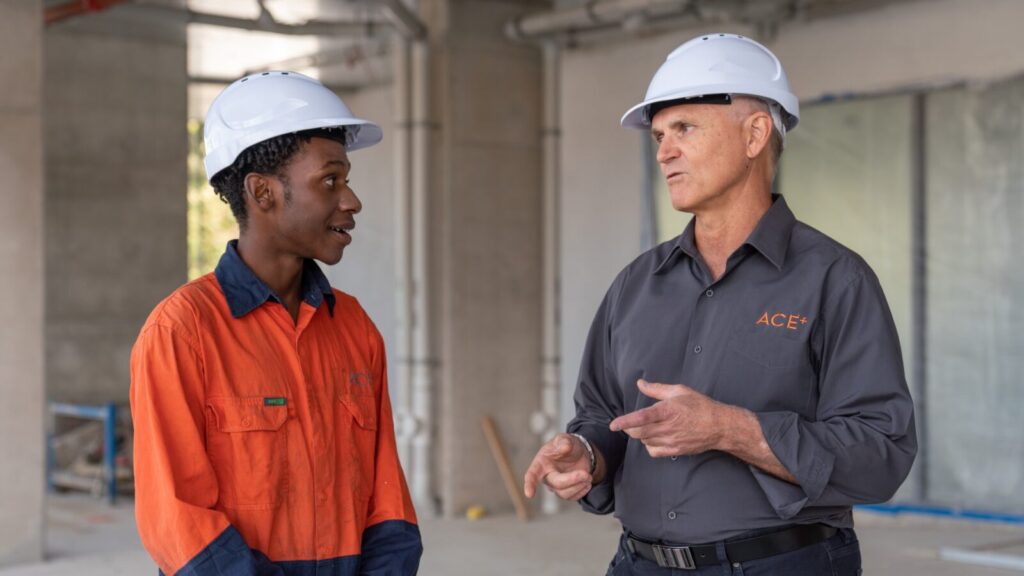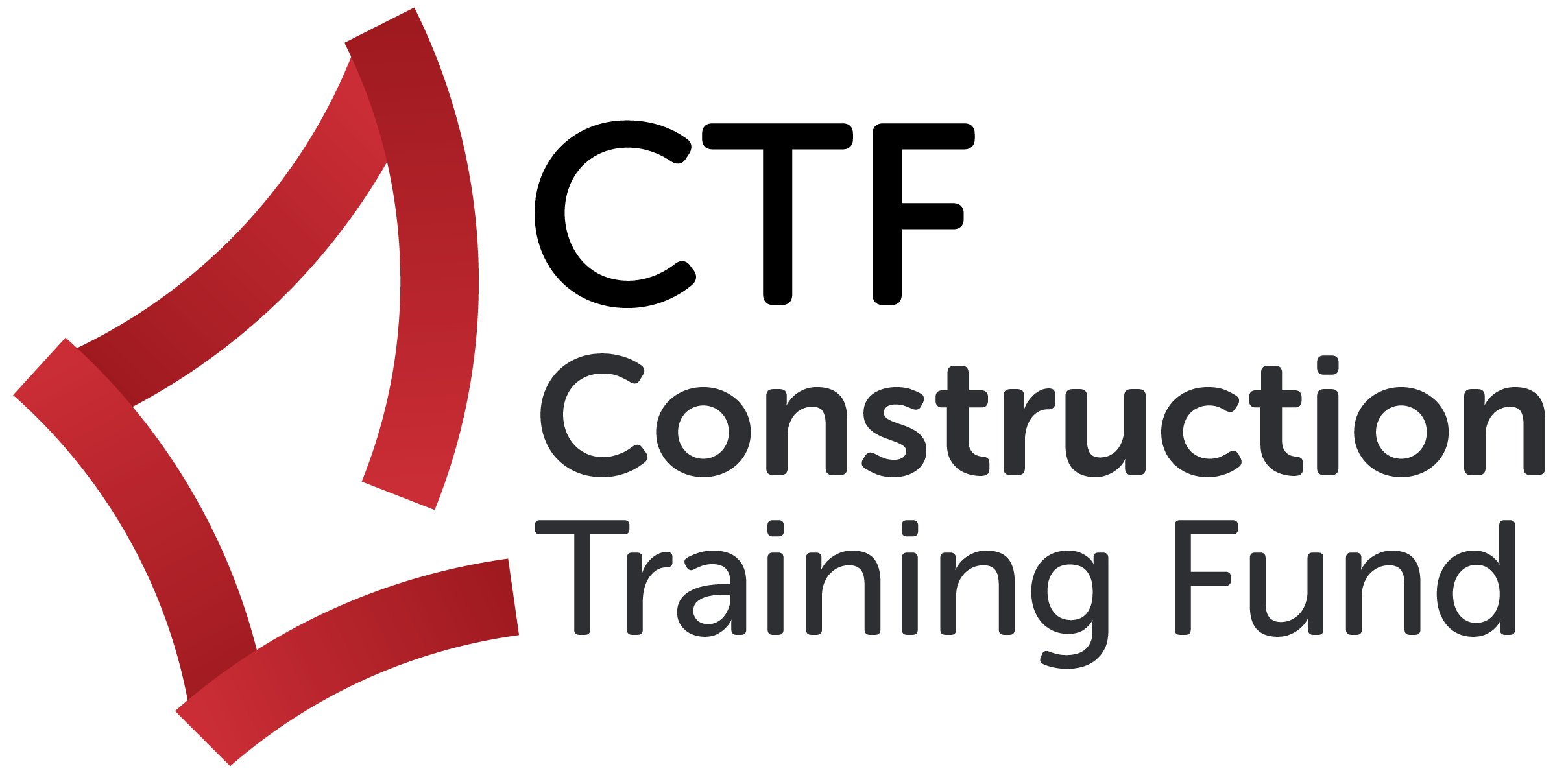If you’re looking to propel your construction company or career to the next level, consider a construction mentoring program.
Construction mentoring programs allow experienced career professionals to guide less experienced workers, such as apprentices and trainees.
A construction mentoring program can be set up internally in a company, or supplied by an external provider.

What are construction mentoring programs?
Construction mentoring programs are training strategies that involve experienced industry professionals passing on skills and knowledge to newer workers. A construction mentor is assigned to one or more mentees and provides them with guidance and advice.
Mentoring quickens the learning and development of a less experienced worker, something that benefits the employee, company, and industry. That’s why some companies create internal mentoring programs, as it also fosters strong relationships between employees. When employees collaborate and train one another, they develop a closer relationship. This empowers them and results in a more cohesive workforce.
Construction mentors leverage their industry experience to advise mentees on their roles. By getting to know their mentee, a mentor learns about their habits, strengths and weaknesses. Based on this, they provide feedback and highlight areas for improvement. At times, they may also be a source of emotional support and encouragement.
What makes a successful construction mentoring program?
Construction mentoring programs come in many forms, but success hinges on some key elements. At its core, mentoring provides opportunities for apprentices to develop genuine working relationships, built on respect and mutual values, that give them the very best chance of success. Careful planning and timely adjustments lead to the best results for everyone.
Before anything else, it’s important to get everyone on the same page. Setting clear objectives and expectations lets participants know what to aim for. Outlining targets that align with the individual needs of the mentee establishes a baseline for success. As participants continue their apprenticeship journey, these goals may evolve and grow to meet new priorities. They also allow people who are new to mentorship to adjust their preconceptions.
To ensure that a mentor and mentee have a productive relationship, finding the right match is crucial. Mentoring is an investment in the future workforce, so establishing a leadership team committed to furthering trainee education is essential. The main guideline is experience level, but there are many considerations beyond that. Pairings might take into account background, learning style, personality, goals and more. The more planning goes into this, the better.
Planning and preparation create a strong base for your program, while adaptability allows you to refine it. Gathering feedback from mentors, mentees, and third-parties pinpoints areas for improvement. Regularly conducting surveys is a good way to gather this information. By addressing concerns and filling the gaps, you end up with a better program over time.
Construction mentorship programs need to be inclusive of everyone to be considered truly successful. Inclusivity comes from creating safe and supportive environments that reflect the diversity of mentors and mentees. People must feel welcome to participate in these programs, regardless of their background. This involves the highest number of employees and creates the biggest benefit.
What are the benefits of a construction mentoring program?
Construction mentoring programs have a positive impact on both companies and the industry as a whole. Both employees and employers have a lot to gain from effective mentorship.
Mentees get the opportunity to expedite their technical skill progression. Under the counsel of their mentors, they learn the best practices for their professional tasks. This could involve more efficient approaches to problem-solving or the implementation of new tools and resources.
Beyond learning about work tasks, mentees can be taught “soft skills” by their mentors. Soft skills refer to non-technical skills that are applicable in most professional contexts. These include organisational skills like time management and planning, or networking skills like making contacts and liaising with clients. Soft skills are invaluable for career progression in the construction industry.
While imparting wisdom to mentees, mentors develop their skills. Finding the right way to convey advice improves communication ability. Guiding someone through a role also provides leadership experience, which helps with their career progression.
Construction companies with more fulfilled and satisfied employees see higher retention rates and lower employee turnover. As a result, companies save a lot of money on hiring and training costs. Combined with the increase in productivity, this makes construction mentoring programs economically advantageous.

What challenges are encountered in construction mentoring programs?
Finding compatible mentors and mentees brings challenges. There are many criteria to consider, and it may take time to identify the right ones.
Employers must provide tools and support for challenges that arise in the program. Learning resources allow participants to get up to speed with the relevant knowledge. Meanwhile, an avenue for feedback helps to identify problems that may still need to be addressed.
Scheduling is an often-overlooked aspect of construction mentoring programs. Employees have different roles and workflows, and it can prove difficult for mentors and mentees to align schedules. Providing the appropriate flexibility to employees will make scheduling more manageable.
The importance of diversity in construction mentoring programs
Diversity is a critical element of any successful construction mentoring program. A program can only be considered adequate if it embraces equity and welcomes people from all walks of life.
Including individuals from a range of backgrounds enriches the mentorship experience for mentors and mentees. Companies are responsible for equal mentor opportunities for all individuals, whether as mentees or mentors.
Allocation of mentorship opportunities should always be equitable. The system for deciding who gets a spot should not be based on favouritism. Using a mix of random allocation and volunteering is ideal in most cases.
It is also worth taking an extra step to proactively involve underrepresented groups. By allocating a specific amount of spots to people in underrepresented groups, you ensure a certain level of diversity in your program’s cohort.
But it’s not enough to simply include a range of people. Companies must foster a safe and inclusive space for all participants in their mentorship program. There must be firm rules establishing that unfair treatment will not be tolerated.
CTF and Nudge Mentoring
As part of our commitment to mentorships in the construction industry, CTF has partnered with Nudge. Nudge is an industry leader in providing mentoring services to the construction industry. Their programs create long-lasting connections between apprentices and organisations, eventually transforming lives, families, and communities. As mentoring specialists, they help small and medium businesses add value to the apprenticeship journey and benefit from fee-free mentoring.
CTF’s partnership with Nudge will cover eligible businesses' mentorship fees. Eligibility extends to small and medium businesses in the civil sector. Trainees and apprentices working towards a qualification can get a leg up with a mentor.
The future of construction mentoring
Construction mentoring has incredible potential for growth in the future. Mentorship can significantly benefit by incorporating technology and seizing new opportunities.
While in-person mentoring is generally preferable, it’s no longer the only viable option. Virtual mentorship is still a highly beneficial way for mentors to pass on knowledge in the workplace. With remote work becoming more common than ever, this should not be overlooked.
Mentorship programs benefit a wide range of individuals, from mature-aged apprentices to inexperienced employees. This makes them well-suited to upskilling construction apprentices. By incorporating mentorship into apprenticeship courses, apprentices can set promising career trajectories early on.
But mentoring isn’t just a one-way street. Mentees may contribute new knowledge to their mentors as well. With the rapid progression of technology, mentors can’t keep up with everything. Many older mentors benefit from the up-to-date software knowledge of their mentees.
The construction industry needs to foster a culture of mentorship. When workers receive better training, this helps everyone in construction. Employees get networking opportunities, and businesses get to shape their future workforce with proficient, diverse apprentices. It’s a win-win!
Incorporating a construction mentoring program
Construction mentorship programs increase your employees' skills, engagement, and satisfaction. This leads to more productive workers and higher employee retention.
If you want to explore the future of your workforce but don’t want to create an internal construction mentoring program, a mentoring program with Nudge might be the right fit for you. Chat to Nudge about how they can support your mentoring goals. You may also be eligible for CTF funding.
Contact a CTF team member today if you have any questions about the program.
Last modified on:

